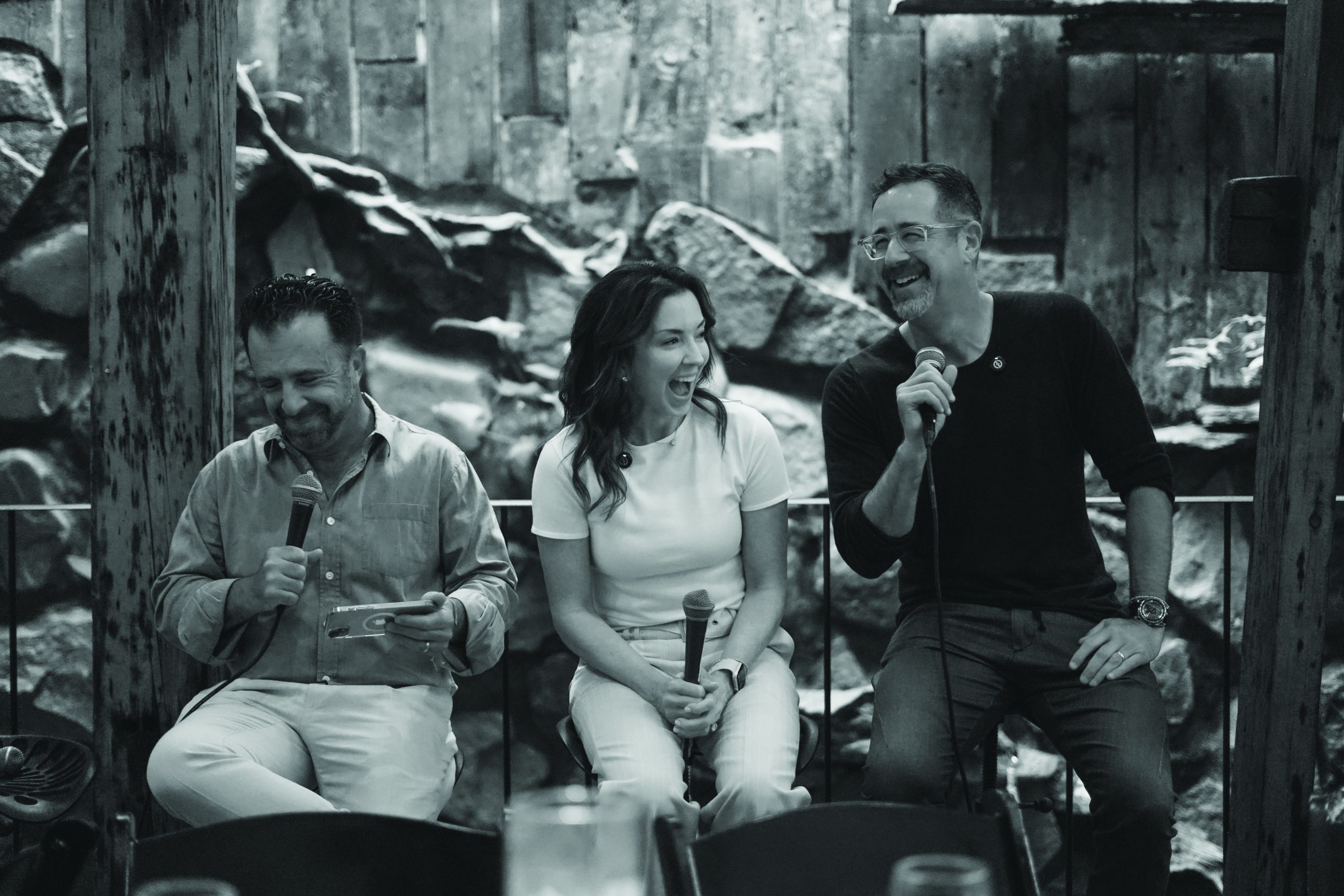Mike and Kass Lazerow: A Couple of Entrepreneurs Who Have Their $h!t Together
Read Time
11 min read
Posted on
August 21, 2025


The husband-and-wife team tell raw, personal stories that show how to triumph over the uncertainty that they say most certainly awaits new entrepreneurs.
Mike and Kass Lazerow wrote a newly released love letter to entrepreneurs starring a four-letter word. If you’ve ever launched a business, the book’s title, Shoveling $h!t, won’t surprise you — in fact, many battle-worn business warriors are surely reading this and nodding their heads in surrender. The book encourages embracing the beauty of the struggle and draws from decades of helping entrepreneurs build companies.
Kass and Mike are serial entrepreneurs and investors best known as the co-founders of Golf.com (sold to Time Warner in 2006) and Buddy Media, the leading social media marketing platform that sold to Salesforce in 2012 for $745 million. Since then they have focused on providing capital and advice to the world’s most innovative founders and have been co-founders and early investors in almost 100 startups generating more than $10 billion in realized gains.
They served as angel investors and advisors to Scopely, which sold to Savvy Games for $5 billion in 2022, and Liquid Death, the canned water company whose “evil mission” is to make people laugh and drink healthy beverages more often, all while helping to kill plastic pollution. He is business development, sales, and product. She is operations and HR.
“The first thing I look at when deciding whether to invest in a startup is the market,” says Mike. “I’ve never seen huge companies come out of tiny markets, so it always starts with that, but the most important thing is the founders. Do they know what they don’t know? Are they humble enough to realize that they’re not going to know the answer to everything? I’m not looking for someone to spin me a great story. I’m looking for humility and authenticity. If they tell me they have the product vision but they aren’t a salesman, that’s the perfect answer to me because I know they get it.”
When considering an investment, Mike and Kass don’t care much about the competition because most markets aren’t winner takes all. They are more focused on building a psychological profile of the founder: Who are they? What motivates them? What’s the product, and why is it different? How well do they know the customer?
Sales and marketing is next. “We care a lot about whether your product can get to market,” says Mike. “You need to be able to explain how to get this into your customers’ hands. How do they find out about it? How do you deliver it?”
Finally, does the financial model make sense? “Yes, you’ll pivot, you’ll change,” Mike says. “But if it doesn’t make sense at the beginning on a piece of paper or back of a napkin, it’s not going to make sense when you launch it.”
So what’s trending right now? Mike and Kass say now is a critical time for investors to look at social impact companies. “Diversity, equity, and inclusion as a corporate marketing term is dead — DEI has been killed,” Mike says. “However, the principles behind it have never been more essential for businesses to embrace because any business that isn’t diverse and celebrates equality for everyone — not only in the company but customers and partners, any company that’s not inclusive to their stakeholders — what kind of company is that? Look at the news. It’s depressing. This is a better time than ever to double down on these principles.”
For example, Kass and Mike are helping Dylan Zajac’s company, Computers 4 People, fix the inequity gap when it comes to computer access across the world. “Dylan’s goal is to donate a million computers, and he’s been working on this all through college. He even came up with a way to give computer lessons to the people he’s giving the computers to,” says Kass. “I love it because I’m seeing a big group of young adults who are very much looking for companies to run that have a social good component, if not the whole business model.”
Oh, $h!t

Kass and Mike hear a lot of pitches, and there are a few things that make them cringe. “First is if they’ve done zero research with their name, and it’s pretty obvious that it’s going to get them in trouble down the road and they’ll have to pivot and rebrand,” says Kass.
Another concern is the inflation of titles. “Everyone wants to seem cool, so when everyone in the group is running around with some C-level title with zero experience, that also makes me cringe,” she continues. “How are you going to operate efficiently and move at the speed you need to as a startup with as many pivots as you’re going to need to do? You’ve got to protect who you hire, give those people the right titles, and put the structure in place from the beginning.”

Mike’s No. 1 pet peeve is a lack of focus. “One of the questions I ask is: What are the top three priorities for your business this year? You would be shocked at how many young founders — and frankly, business owners — don’t know that,” he says. “If you don’t know what you need to be focused on, how do you know where you’re going and what you want to accomplish? If you as the founder don’t know it, your whole organization definitely doesn’t know it. We like clarity. You have to know how to spend your resources, and if you don’t have clarity of vision, you have no chance.”
The Culture Formula
The Lazerows are often asked how to build a strong culture, especially in remote work environments. “It definitely stems from leadership,” Kass says. “It’s your job as the leader to make sure you know what you’re concentrating on. What is the mission of this company over the next 12 months? Your job is to make sure everyone is on the same page.”
Kass emphasizes that an important part of the culture formula is making sure everyone understands the focus. “They’ve got to understand it because they have a role in that focus,” she points out. “The goal might be $10 million in revenue, but you have to show them how every team within the company should work to get that. You explain it, you show diagrams on how every person in the company connects to that mission, and then your job is to say it over and over and over again. You can never say it enough. You’re saying it in one-on-one meetings, in small groups, to teams, to investors, in press releases.”
Kass says most companies believe that it’s easier to have people remote, but there are problems with that. “You learn a lot from being around other people. You learn the skill of reading other people, understanding how to negotiate, how to pick up on little nuances,” she says. “As the leader you have to show them how you interact with people. Companies hate when I say this but if they are going to have remote teams, then the leaders need a budget so they can go around the country. If you can’t afford to bring everyone in, you’ve got to do the road show, you’ve got to have hubs, you’ve got to have in-person meetings. I feel very strongly about this.”
Building culture is about the traditions, the symbols, the celebrations. “Whether you have a remote workforce or everyone in person, culture isn’t just about the good times,” Kass says. “It’s getting through a necessary pivot or losing a big customer. Is everyone going to stay with you even though they’re scared about the unknown and what’s going to happen? Do they believe the leaders got this? Are the leaders communicative and transparent about everything? Don’t shine the turd. Culture is built on the tough times and how you tell people what’s happening and what they should be doing.”
Mike adds that while he and Kass are realists, his belief is that companies should be in person. “If I am starting a company today, I want to be together,” he says. “I think we’ve all got to go back to the office, even if it’s hybrid. That’s the way you execute strategies and have any chance of creating relationships that stick.”
Forget Work-Life Balance
In the new book, Kass and Mike write about the imbalanced life of an entrepreneur. “You can only do one great thing at a time,” says Kass. “When I think about entrepreneurs and the amount of crap thrown at them — you lose your office space, three people quit, there’s a lawsuit, you have to rebrand — there’s never enough time to do everything at its top level.”
She says she and Mike accepted from the beginning that they would be sacrificing their kids’ childhood for a while. “Our hope was that we could give more back to them when they were a little bit older,” she says. “We calculated for that. We didn’t have many friends outside of work. Spring break was our family time.”
“There’s no balance because it’s unlimited work,” Mike says. “You’re not just doing a job — there’s this whole world that you’re in charge of — and that leads to a lot of fear and doubt. You will be miserable many days, and you’ll say to yourself, ‘I don’t want to do this.’ You will be miserable and realize at the same time that it’s the only thing you were put on earth to do. It’s where you’ll find your passion, your purpose, but it comes with significant personal costs.”
Kass and Mike want to help leaders embrace the uncertainty because they say that’s the best way to handle the fear — not eliminate it but thrive inside it, and be able to make better, more confident decisions.
“Don’t try to separate personal from business — just live your life,” Mike advises. “If it’s important, make it part of your day-to-day living. Make giving back part of your nine-to-five, not just nights and weekends. You’ll get better at navigating risks and helping people. All of a sudden you’re a better employer, mentor, friend. You’re communicating better, having the hard conversations, staying healthy. There will be this new-found calmness inside the shitstorm. The shitstorm doesn’t go away — and you don’t want it to — because the shitstorm is what takes people and companies to the next level.”
Check Your Ego
The sacrifices paid off for Kass and Mike, who live happily in New York City and Hudson Valley and have three grown children and two rescue dogs. “One of our family’s favorite phrases when our kids were young was, ‘We never give up, and we always give back,’” says Kass. “I love that even with everything going on, our kids saw and recognized this was our way. There’s no better drug out there than giving back as leaders with unconditional support and love to help glue the culture together.”
Even with disruptions, rising costs, and trade wars, they believe it’s a great time to be an entrepreneur. “The best time to start a company is today,” says Mike. “Whether you’re in a depression or have zero revenue, you’re not going to do less than zero. It’s time to build — but always be ready to pivot.”
“The pivot is not something to fear,” adds Kass. “It’s something to embrace just like other uncertainties. Your ego can’t drive decisions. If ego drives the decision, you’re too late. You might have to pivot three, four times. Ask, ‘What do my customers really want, and did I build that?’ You literally have to step aside and check your ego.”
Mike and Kass also encourage entrepreneurs to fully integrate the impact that they want to make into the business. “Businesses and entrepreneurs are the biggest drivers of good in this country,” he says. “It feels so good to use your resources and your company for good. When you give, you get so much more in return. You get a company with a purpose and people who feel like they’re not only working together but doing good together.”
Overview
Entrepreneurs Mike and Kass Lazerow share candid insights on navigating the challenges of startups, emphasizing humility, focus, and adapting to market needs over ego-driven decisions. They highlight the importance of leadership in building strong company culture, especially in remote settings, and stress integrating social impact into business models. Their advice is aimed at founders seeking practical guidance on growth, resilience, and purpose-driven entrepreneurship amid uncertainty.
AI-Generated Overview.






